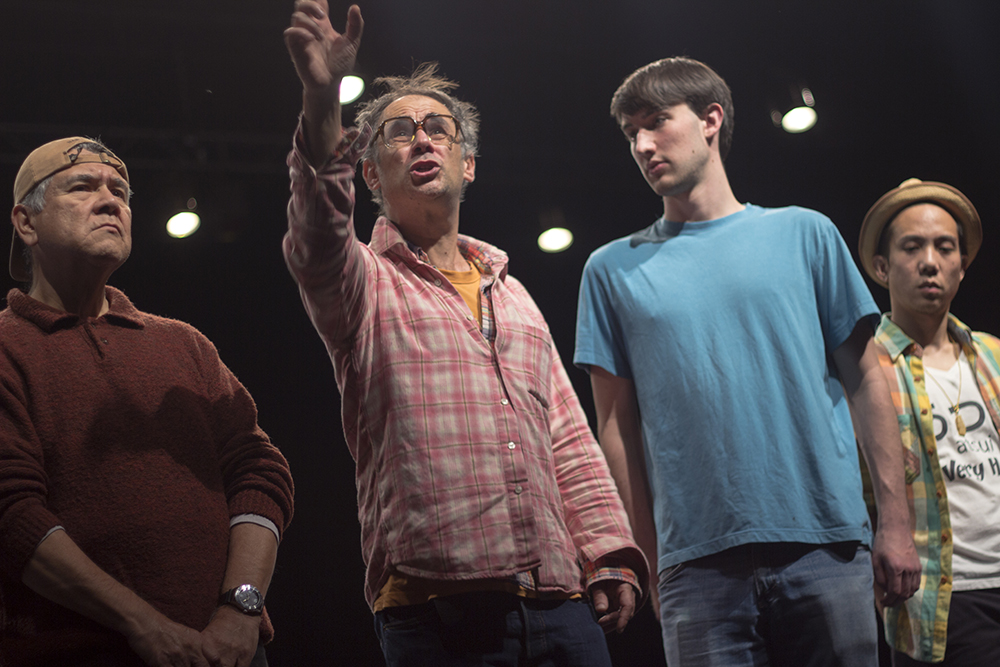Q&A: Jérôme Bel discusses rationale behind his choreography

French choreographer Jérôme Bel brings his experimental, minimalist theater dance to UCLA’s Freud Playhouse this Thursday and Friday. The dance explores the clash of fine art and entertainment.
By Rhyn Cheung
Dec. 5, 2013 12:19 a.m.
Jérôme Bel, a celebrated French choreographer, is re-staging one of his most well-known works, “The Show Must Go On,” at the Freud Playhouse Thursday and Friday night. Staged only four times since its debut in Paris 12 years ago, the choreography will be performed by a cast of 25 UCLA students and staff members and questions the fundamental practice of dance and the role of the audience in theater performances. Daily Bruin’s Rhyn Cheung spoke with Jérôme Bel about his dance’s influence in theater and his experience working with UCLA students and staff performers.
Daily Bruin: What is “The Show Must Go On” about? Can you tell us a bit about the show?
Jérôme Bel : It
was an experimental dance I
made 12 years ago that questions what is dance and why do we dance? How does dance relate to people? Why do performers and audiences gather and do something together? It was performed in Tokyo and New York and many other cities. The
cast is a mix of professional and non-professional dancers – people who have never danced before – so there is more connection to the audience. Five years ago, I decided to re-stage the work in
cities where we are invited to and cast performers from there.
DB: Why did you title it “The Show Must Go On?”
JB: I do believe that theater is a very archaic practice. Western theater was born in Greece and didn’t change
for 2,500 years. In between, we have cinema, internet and television that have all the amazing visual effects. Here in theater (such effects) are still very poor: People on the stage cannot fly and
there is no blood. But I do believe that the theater is still relevant. It is an
experience that is singular and specific, and should be kept going on.
DB: What did people think about the dance after the first show 12 years ago?
JB: It was a big provocation for the audience, people were coming on the stage (after the show), because we danced very little. The
paradigm of the dance is totally different from what people are used to. It was
a riot.
DB: By riot, are you referring to the reaction from the audience?
JB: Yes. They were asking for their money back. It was a dance that everybody could do. That’s why there was a riot, because the audience paid for something that they could do. And the reaction was very extreme: some people liked it very much while (some) hated it. There was nobody in the middle. I like the reaction because it proved that the dance is affecting people.
DB: What kind of music did you use for the dance performance?
JB: They are some pop songs from the ’70s to the ’90s (such as “Killing Me Softly With His Song” by Roberta Flack). I used these songs because the audience can relate to them (and not) classical music, like we are trying to outsmart the audience. We want them to be involved and connected.
DB: What is theater to you?
JB: Theater dance is people performing live in front of you. It’s not like a recording, a Hollywood movie that doesn’t change, nor (is it) like (when) you are alone on the internet. This production questions the audience and provokes their thoughts in that specific moment – it is demanding
for them. We care about (them), we know (they) are there and the show is also about (them). We know that theater is gathering of viewers and performers who are
alive and the performance is affected by reaction. This is what theater
is – it is alive.
DB: How has your experience been working with UCLA students and staff members?
JB: I’m very impressed! They are very smart. They understand what I want for the dance and do specifically what I ask. I like to work with them.
DB: What should we expect to see in the dance show?
JB: You shouldn’t expect anything when you are going to see an experimental dance. You should just come and see what is going to happen. Just be open and receptive to new ideas.


